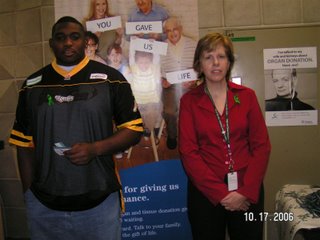News Release
October 26, 2006 – Air Canada Centre, Toronto, ON – Maple Leaf Sports & Entertainment (MLSE) and Trillium Gift of Life Network (TGLN) announced a groundbreaking community partnership to educate employees on organ and tissue donation today, while challenging other companies in Ontario to do the same.
"Organ and tissue donation is a vital issue that affects all Canadians and is responsible for saving and giving quality of life to thousands of people each year," said Richard Peddie, President and CEO of MLSE. "Our company and employees support the Trillium Gift of Life Network and the great work they do in raising awareness and educating about the importance of signing your donor card and sharing your decision with your family."
In line with MLSE's company value of demonstrating community leadership, Peddie issued a corporate challenge to all companies across the Greater Toronto Area to not only talk to their employees about organ and tissue donation, but also encourage them to sign their donor card and speak to their families.
“We are very excited about this partnership,” said Frank Markel, President and CEO, TGLN. “Maple Leaf Sports and Entertainment has really shown a great deal of leadership and initiative in terms of corporate responsibility. They know we need to get people talking to their families about their organ donation wishes.
We are grateful to Richard and his teams for helping us with this important work. We hope that companies across this province will look to them as an example and also become partners with us in the near future.”
The announcement was made at a MLSE meeting where 400 employees including Wendel Clark and Darryl Sittler heard from TGLN staff, 14-year old Brandon Gibson, who is on the waiting list for a double lung transplant and Heather Bishop, a heart recipient, about the importance of organ and tissue donation.
Both organizations will work together on several internal and external awareness pieces including:
- Distribution of a special Toronto Maple Leafs Poster featuring former Captains Wendel Clark, Rick Vaive and Darryl Sittler, as part of the TGLN Celebrity Awareness Campaign
- A voicemail from the President supporting organ and tissue donation
- Distribution of donor cards and materials to employees at work
- Display of donor-related materials in high traffic areas (cafeterias, lobby etc.)
- Addition of www.giftoflife.on.ca to the MLSE intranet site
- Hosting of educational events for employees
- Placement of articles about organ and tissue donation in newsletters
- Placement of a TGLN link on the company website
Today in Ontario, 1750 patients are on the transplant waiting list. Of those, 1092 are men, 658 are women and 27 of those patients are children.
“I love the Maple Leafs,” said Brandon Gibson. “I’m glad to know that the Maple Leafs and the Raptors will be telling people about organ donation. Everyone here needs to know that they have the power to make a difference to someone out there. They need to know they can make a difference to someone like me.”
The partnership, which is effective immediately, will focus on the key issues for organ and tissue donation and raise awareness about the importance of talking to your family about your organ donation intentions.
“Every 3 days someone who is on the organ donation waiting list dies,” said Markel. “Sign your organ donation card and tell your family what your organ donation wishes are. You can make a difference. Maple Leaf Sports and Entertainment made a difference today – now it’s up to you.”
For more details about the Community Partnership Program or Trillium Gift of Life Network please visit our website or call 416.363.4001 or toll free 1-800-263-2833.

